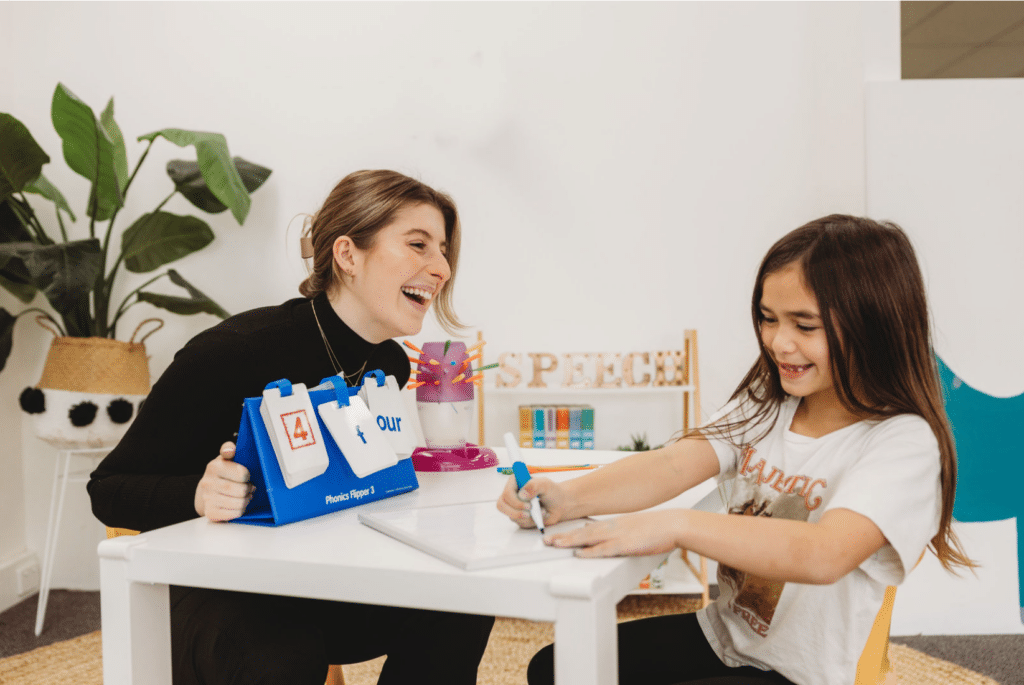For Parents
Common questions about speech therapy
Does my child need speech therapy? Is speech therapy the right therapy for my child? What exactly is speech therapy? These are questions that speech pathologists get asked every day by parents. The answers to these questions are different for every child and family. However, we hope the information below is a helpful first step.
Children are learning and developing in so many areas as they grow. Their skills in communicating with others and the world around them is just one example. Children typically develop their speech sounds and language skills at different ages. These are also referred to as communication milestones. But how do you know if your child’s development is age appropriate? And when should you seek a speech pathologist for support?
Parents (or even teachers and doctors) often notice that their child has difficulty talking or listening. Sometimes it may also be that your child’s communication development has stopped progressing. A speech therapist can support children in all areas of communication. There may be much more we can support your child with than you think!
Not sure if your child needs speech theraphy? Book a free consultation.
7 signs that your Child should See a Speech Therapist:
- Difficulty being understood by others. If other people find it hard to understand your child, it may be because they have unclear speech sounds. They may also be swapping their sounds around1.
- Later talkers. If your child is 24+ months, it is expected that they are combining 2 or more words together in simple sentences. If your child is saying 1 word or no words at all, a speech therapist can help. We support parents with their child’s early language development3.
- Difficulty following directions. Some children we see have difficulty following 2+ step instructions. This may be at home or in a group environment at daycare or school2. This is often missed if a child copies their peers when given instructions at school. They may also assume the next step in a routine instruction at home e.g. brushing teeth. Difficulty following directions indicates that your child has difficulty understanding language.
- Difficulty organising their thoughts and ideas/word finding difficulties. If a child is 3 years or older and has difficulty making sentences or finding their words, this is a sign of a language difficulty2.
- Consistent repetition of sounds, syllables or words when talking. This can be a sign of stuttering. Research shows us that early intervention is key to stopping or reducing stuttering. After the age of 6, it becomes more a matter of management strategies4.
- Having literacy difficulties at school – reading and writing. Speech Pathologists help children with their reading, writing, and spelling school work! We complete a thorough assessment of their literacy and language skills. This helps us to find the underlying difficulties impacting their literacy. We then target those specific areas to support a child’s reading and writing skills. Some children need extra support to build a strong literacy foundation. This helps them progress well academically alongside their peers5.
- Difficulty building friendships and socialising with other children. Children can have difficulty following the rules in games, joining in play, and making friends. Speech Pathologists help to increase your child’s confidence to interact with their peers and make friends6.
References:
- https://www.asha.org/practice-portal/clinical-topics/articulation-and-phonology/#:~:text=Speech%20sound%20disorders%20is%20an,sound%20sequences%20in%20a%20language.
- https://radld.org/about/dld/
- https://www.asha.org/practice-portal/clinical-topics/late-language-emergence/
- https://www.uts.edu.au/asrc/information-about-stuttering/what-stuttering
- https://wnswlhd.health.nsw.gov.au/our-services/speech-pathology/childrens-literacy/
- https://www.asha.org/public/speech/development/social-communication/




